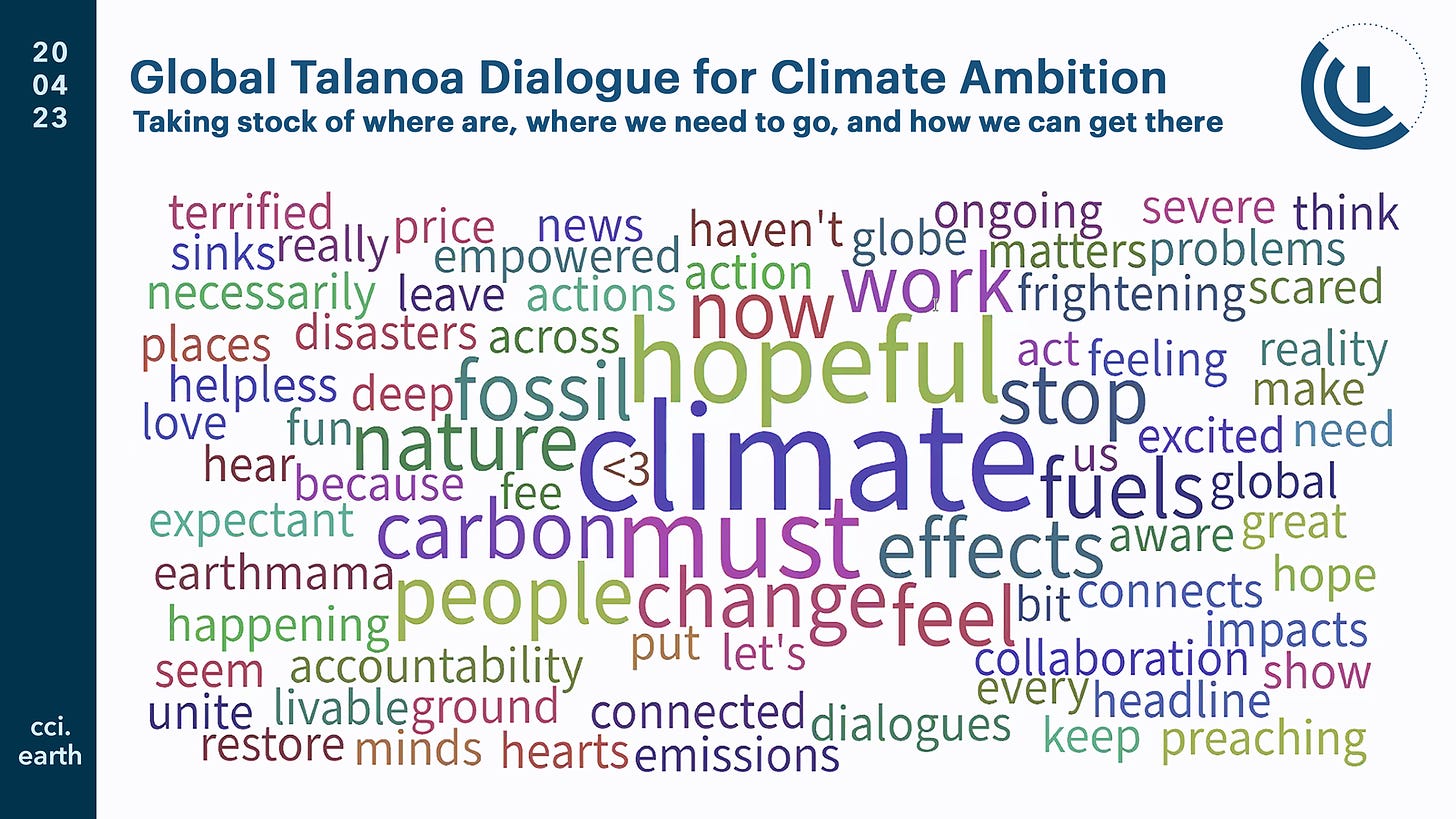Report from Earth Week Talanoa Dialogue for Climate Ambition
Stakeholders cite ongoing climate damage, call for urgent action to reduce vulnerability and build resilience, for all
This year our Earth Week Citizens’ Forum was a Global Talanoa Dialogue for Climate Ambition, designed to share insights on stakeholder experiences of climate impacts and the hard work of mobilizing climate action, from the local level.
The Talanoa Dialogue was established by the Fijian presidency of the COP23 United Nations Climate Change negotiations, as an open space for person-to-person sharing of climate-related experiences, values, and goals. The aim was to build stakeholder insights into high-level climate policy, and to ground global climate crisis response in life at the human scale.
The core questions stakeholders are asked to answer are:
Stocktaking: Where are we now? What are we experiencing? What is the human experience of the climate crisis?
Livable future: What do we need to do to address and overcome the climate crisis? What are our goals?
Strategies: What strategies, policies, cooperative approaches, and innovative solutions can get us there?
Citizen-stakeholder climate advocates submitted video statements. Listen to some of them in the video below.
The Dialogue included testimony and solutions from Africa to the Himalayas, and from Europe to Latin America. We heard about devastating local climate impacts, about the disruption to everyday life and to whole communities and cultures, and about the policies we need to put in place to secure a livable future.
Key Takeaways
Above all, there was a common theme across diverse experiences, that climate emergency is a shared crisis, and so we need a shared space for visioning a livable future. This is the spirit of Talanoa—sharing stories, building empathy, and coming together with new understanding to make decisions for the collective good.
We heard that vulnerability is a present-day concern—impacting people now, in many ways. We heard recognition that we are facing a global state of emergency, with impacts affecting every aspect of human experience. Climate-related impacts are disrupting food supplies, driving involuntary migration, sowing the seeds of conflict, and creating conditions for global instability.

Climate emergency makes economic prosperity more difficult, and even impossible, in the most affected communities and regions. Insecurity and lawlessness, resulting in part from collapsing economies and institutions, are additional threats to environmental protection, to climate action, and to human health and wellbeing.
The climate system makes our ethical obligations into a physical fabric that connects us all. Local experience, opportunity, security, and wellbeing are affected by national and global circumstances.
The great Danube River—a shaper of history and of nations—was so dry last year, it ceased to be navigable.
The Aral Sea disappeared almost entirely, after human activity and climate change combined to empty the basin and its tributaries.
In the Eastern Himalayas, temperatures are warming faster than the global average, and glaciers are melting at historic pace.
Floods driven by global heating destroy infrastructure, collapse local economies, and drive mass migration.
Islands are already being evacuated in Central America due to rising seas; this trend will continue, globally.
Devastation from floods, and from water-scarcity, drought, severe storms and food supply collapse, are forcing people to migrate.
People who have a universally recognized right to a homeland are losing the home they have known and becoming climate refugees—now, today.
In all parts of the world, there was clear recognition that we need a systemic energy transition. We need accelerated decarbonization, driven by accelerated investments; we need to leave fossil fuels in the ground, and value and protect nature. We need partnerships that support investment for impact, to improve conditions for nature and for people.
There was a consistent call for genuine, sustained, and inclusive leadership. Some of the values and insights shared about climate leadership include:
Leadership requires action, showing the way, innovating inclusively, and following through on commitments;
Global leadership necessitates a demonstration that you can “keep your own room tidy”, be an example, and set high standards;
We need leadership at all levels to build capacity, take action, and fund enhanced technical capability.
Restoring agricultural lands, protecting forests, are ways of securing communities, economies, and human health and wellbeing. Education at the local level, and citizen participation in a shaping a climate-positive agenda are ways of building the capacity needed—making plans and ideas into living realities.
As the disruptions linked to climate change interact and multiply, we will need to stop, rethink, redesign, and get to work mitigating both current and future impacts. That means valuing risk and resilience, and including everyone affected in the calculation of whether an enterprise holds promise.
Efforts to shift structural incentives—through carbon pricing policies and direct delivery of resources to communities, to deal with climate impacts and accelerate the transition—are urgently needed. Clean economic development strategies can and should be designed to support everyday adoption of climate-safe practices.
We need local solutions, tailored to local needs; we cannot afford to just repeat something done elsewhere that might not have sustainable or just outcomes in a new place. Our economies—and the financial system that sustains them—need to value local non-monetized, non-market activity that benefits nature and protects people. Individuals putting nature-based solutions in place can restore ecosystems, sustain vital habitat, and protect watersheds, food systems, and communities.
And maybe the most important insight of all: People—including the most vulnerable and marginal communities—are the solution to human-caused crisis. So, we cannot ignore the need to value and empower every human being.



